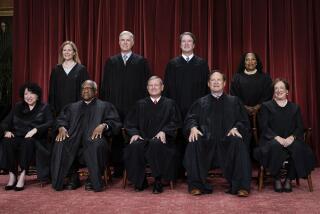Panel to Revisit White House Travel Firings : Congress: House will hold one-day hearing into 1993 scandal, looking for evidence of cronyism within Clinton team.
- Share via
WASHINGTON — The firing of seven employees from the White House travel office, an all-but-forgotten fiasco of the early Clinton Administration, will be examined today by a House committee intent on showing the episode is an example of cronyism and mismanagement.
According to congressional sources, the House Government Reform and Oversight Committee plans to focus on an internal White House review, which found that several Administration officials had acted unwisely or inappropriately and that outside pressure from Clinton friends and ill-advised attempts to involve the FBI had occurred.
A key witness will be John Podesta, a Washington lobbyist who was White House staff secretary at the time of the May, 1993, dismissals. Podesta ordered a post-mortem into the firings.
Another witness will be Michael Shaheen, head of the Justice Department’s Office of Professional Responsibility, who has said the White House withheld notes suggesting that the subsequent suicide of deputy White House counsel Vincent Foster Jr. was partly related to his anguish over the mishandling of the travel office incident.
Committee Chairman William F. Clinger Jr. (R-Pa.) has rejected requests from Atty. Gen. Janet Reno to postpone the one-day hearing because a federal criminal trial of former travel office manager Billy R. Dale is scheduled to begin later this week.
Dale, 58, a career civil servant, has pleaded not guilty to charges of embezzling thousands of dollars over a six-year period in funds deposited by news organizations to cover the cost of reporters traveling with the President.
The committee hearing, as well as Dale’s trial, may shed light on internal workings of the White House and on what some allege was a “get Dale” effort by Clinton associates who had their own business or personal interests in the travel office.
The firing of Dale and six others followed complaints about the travel office by two friends of the President--Harry Thomason, a Hollywood producer, and Catherine Cornelius, a distant cousin of Clinton’s. However, evidence of possible criminal wrongdoing by Dale did not surface until months afterward.
Friends of Dale have charged that Thomason owned an air-charter business that wanted a share of the White House travel business and that Cornelius had expressed desires to run the White House travel operation herself.
Cornelius has admitted that she secretly took documents from the travel office in early 1993 before the dismissals. She has not been charged with any offense. She and Thomason, however, are expected to be portrayed as “heavies” at Dale’s trial by Dale’s defense lawyer, Steve Tabackman.
Robert S. Bennett, a Washington attorney representing Thomason, said that his client “has not done anything improper, unethical or illegal,” adding that “there are those who are conducting a witch hunt and attempting to use him as a vehicle to embarrass the White House.”
During the criticism that followed the firings, the Administration backed off, offering five of Dale’s employees other government jobs while a sixth worker retired. An internal White House review led to reprimands of top Clinton aides. Evidence has surfaced that the White House pressured the FBI to state erroneously that the bureau was looking into the conduct of travel office workers.
While the White House has furnished numerous documents to Clinger’s committee in response to a subpoena, a committee source said that about 300 of the most sensitive records are still being withheld by the Administration.
More to Read
Sign up for Essential California
The most important California stories and recommendations in your inbox every morning.
You may occasionally receive promotional content from the Los Angeles Times.













